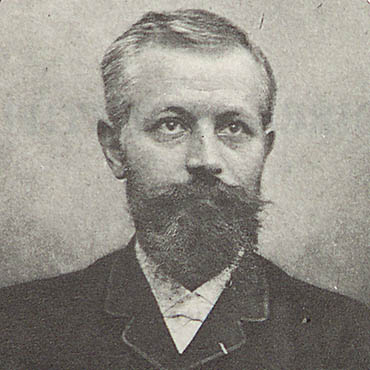Tannery was born in Mantes-la-Jolie, in the Île-de-France region, in 1843; he was the brother of Jules Tannery, who would be one of the most well-known mathematicians and philosophers of science. After learning the first principles of grammar and mathematics on the knees of his father and attending primary school in a number of cities, while at the same time pursuing classical studies, he enrolled in the École polytechnique, from which, while little more than an adolescent, he moved to the École d’application des Manufactures de l’État. He left with the title of engineer specialising in tobacco and immediately went to work in various roles in a number of ministries, until he became director of tobacco in Lot-et-Garonne and director of manufacture in Pantin.
As he was not completely happy with his technical studies, during his apprenticeship he had followed the Cours de philosophie positive of Auguste Comte and even if he never became a follower of “positivist religion”, he drew inspiration from it for his future as a researcher. The proximity of Paris made it easier for him to study philology, philosophy and also the history of mathematics, his main interest, which he always pursued with great enthusiasm, even though he was often obliged by his work to move to the provinces to carry out a great variety of technical tasks. His work on sources was helped by his perfect knowledge of Greek, Latin, Arabic, Hebrew and the main modern languages.
His collaboration with the most important French and European journals was substantial and was the blueprint for an impressive number of learned historical studies, which sat alongside volumes on the history of ancient science and critical editions issued by the most prestigious publishers: one example will suffice, the Opera omnia of Diophantus of Alexandria prepared for the Teubner publishing house. Central to his relationship with Antonio Favaro were the two monumental works: the Œuvres de Descartes and the Œuvres de Fermat, the first virtually finished, the second not completely. “Paolo Tannery”, wrote Antonio Favaro, “is now the third, I could almost say colleague, who I see fall at the last hurdle without having completed the work of his dreams, a seriously sad warning for those who embark on major and of necessity long literary jobs”.
The ongoing comparison of methods that lasted more than twenty years had been transformed into a genuine friendship that Favaro and Tannery shared and nurtured. For the celebrations of the tercentenary of Galileo’s chair in Padua Favaro also wanted Tannery to be one of the historians of science to be invited to take part. Praising the “greatness of his spirit” he recalled how more than once the French scholar had taken a step back, giving up to others various documents that he had found and renouncing his ownership of results that he had reached autonomously.
Tannery also devoted himself to teaching, holding courses on the history of arithmetic at the Sorbonne and of Greek and Latin philosophy at the Collège de France as a substitute for Charles Lévêque. But the chair of the general history of science, which had become vacant with the death of Pierre Laffitte, was denied to him because of political and academic intrigues, with widespread disapproval, disapproval as powerful as it was pointless, which Tannery himself helped to placate. Tannery is also responsible for his unceasing effort to spread and teach the history of science, for which he demanded a separate session (of which he was nominated president) at the International Historical Congress held in Paris in 1900. He also endeavoured to have a major role carved out for his subject at the conferences on mathematics and philosophy held in 1904 in Heidelberg and Geneva respectively, just before his premature death that year at Pantin.


